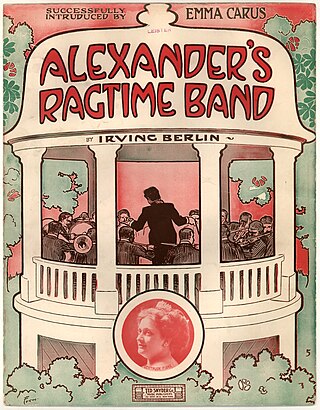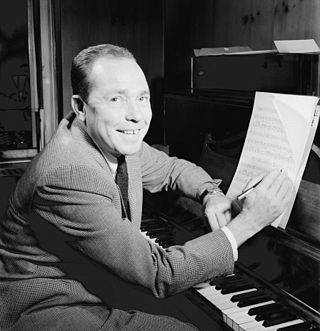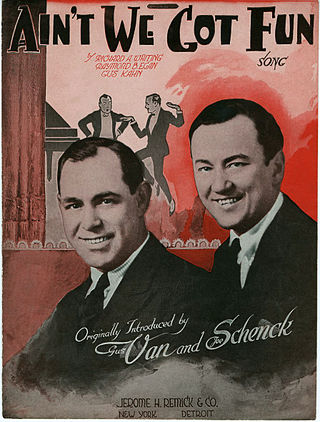
Andy Razaf was an American poet, composer, and lyricist of such well-known songs as "Ain't Misbehavin'" and "Honeysuckle Rose".

"Alexander's Ragtime Band" is a Tin Pan Alley song by American composer Irving Berlin released in 1911; it is often inaccurately cited as his first global hit. Despite its title, the song is a march as opposed to a rag and contains little syncopation. The song is a narrative sequel to Berlin's earlier 1910 composition "Alexander and His Clarinet". This earlier composition recounts the reconciliation between an African-American musician named Alexander Adams and his flame Eliza Johnson as well as highlights Alexander's innovative musical style. Berlin's friend Jack Alexander, a cornet-playing African-American bandleader, inspired the title character.

John Herndon Mercer was an American lyricist, songwriter, and singer, as well as a record label executive who co-founded Capitol Records with music industry businessmen Buddy DeSylva and Glenn E. Wallichs.

George Gard "Buddy" DeSylva was an American songwriter, film producer and record executive. He wrote or co-wrote many popular songs and, along with Johnny Mercer and Glenn Wallichs, he co-founded Capitol Records.

Lew Brown was a lyricist for popular songs in the United States. During World War I and the Roaring Twenties, he wrote lyrics for several of the top Tin Pan Alley composers, especially Albert Von Tilzer. Brown was one third of a successful songwriting and music publishing team with Buddy DeSylva and Ray Henderson from 1925 until 1931. Brown also wrote or co-wrote many Broadway shows and Hollywood films. Among his most-popular songs are "Button Up Your Overcoat", "Don't Sit Under the Apple Tree", "Life Is Just a Bowl of Cherries", "That Old Feeling", and "The Birth of the Blues".

Key Largo is a 1948 American film noir crime drama directed by John Huston and starring Humphrey Bogart, Edward G. Robinson and Lauren Bacall. The supporting cast features Lionel Barrymore and Claire Trevor. The film was adapted by Richard Brooks and Huston from Maxwell Anderson's 1939 play of the same name. Key Largo was the fourth and final film pairing of actors Bogart and Bacall, after To Have and Have Not (1944), The Big Sleep (1946), and Dark Passage (1947). Claire Trevor won the 1948 Best Supporting Actress Academy Award for her portrayal of alcoholic former nightclub singer Gaye Dawn.
The Great American Songbook is the loosely defined canon of significant 20th century American jazz standards, popular songs, and show tunes.
"Too Marvelous for Words" is a popular song written in 1937. Johnny Mercer wrote the lyrics for music composed by Richard Whiting. It was introduced by Wini Shaw and Ross Alexander in the 1937 Warner Brothers film Ready, Willing and Able, as well as used for a production number in a musical revue on Broadway. The song has become a pop and jazz standard and has been recorded by many artists.

"Ain't We Got Fun" is a popular foxtrot published in 1921 with music by Richard A. Whiting, lyrics by Raymond B. Egan and Gus Kahn.
Henry MacGregor Woods was a Tin Pan Alley songwriter and pianist, he was a composer of numerous film scores.

"After You've Gone" is a 1918 popular song composed by Turner Layton with lyrics by Henry Creamer.
"You Took Advantage of Me" is a 1928 popular song composed by Richard Rodgers, with lyrics by Lorenz Hart, for the musical Present Arms (1928), where it was introduced by Joyce Barbour and Busby Berkeley as the characters Edna Stevens and Douglas Atwell. The characters were formerly married, but still have romantic feelings for each other. On opening night, Berkeley forgot the lyrics and had to scat and hum the entire second verse. Berkeley also claimed that his nonsense lyrics for the improvised second verse left Hart "almost apoplectic", but the audience was amused and Hart later forgave him. The song was subsequently included in the 1930 film Leathernecking, an adaptation of Present Arms.
Philip George Furia was an American author and English literature professor. His books focus on the lyricists of the Tin Pan Alley era.

"Alabamy Bound" is a Tin Pan Alley tune written in 1924, with music by Ray Henderson and words by Buddy DeSylva and Bud Green. It was popularized by Al Jolson and included in the musical Kid Boots, where it was sung by Eddie Cantor. Successful recordings of the song were released in 1925 by Paul Whiteman, Isham Jones and Fletcher Henderson (instrumentals), as well as Blossom Seeley, whose vocal version reached number 2 on the charts. The song has sold over a million copies of sheet music and has been included in several films over the years.
"A Soldier Speaks" is a song from 1944, with music and lyrics by Peter DeRose, and published by Robbins Music Corp.

"We're a Couple of Swells" is an American comedy duet song performed by Judy Garland and Fred Astaire in the film Easter Parade (1948). It was written by Irving Berlin. Berlin originally wrote the song "Let's Take an Old-Fashioned Walk" for the scene, but the film's producer, Arthur Freed, persuaded Berlin to change this for a song that would highlight Garland's comedic talent. Berlin wrote the song in about an hour drawing on his experience as a Tin Pan Alley popular songwriter.
"She's Funny That Way" or "He's Funny That Way" is a popular song, composed by Neil Moret, with lyrics by Richard Whiting. It was composed for the short film Gems of MGM in 1929 for Marion Harris, but the film was not released until 1931. Harris sang it as "I'm Funny That Way".

George Addison Norton, usually credited as George A. Norton, was an American lyricist and composer of popular songs.











